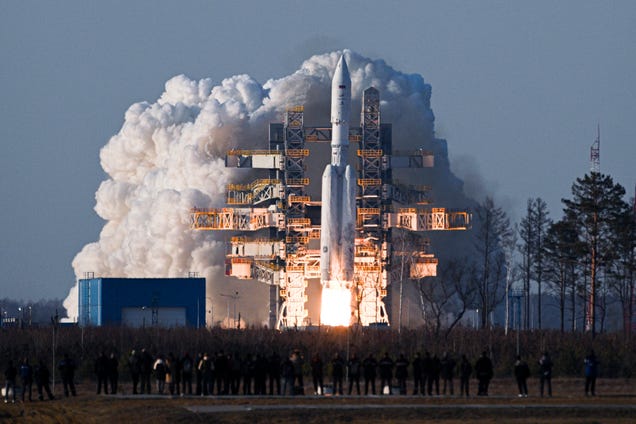The three-stage rocket has taken flight on three previous occasions, but today’s launch from the Vostochny Cosmodrome in the far eastern Amur region marks an important first, as Russia seeks to modernize its space program and keep pace with the rest of the world.
The big rocket, standing nearly 179 feet (54.5 meters) tall, rumbled off the Vostochny launch pad at 5:00 a.m. ET this morning, according to Russian space agency Roscosmos. The mission went as planned, with the Angara A5 successfully delivering a test payload to low Earth orbit.
The heavy-lift rocket, first launched in December 2014, has now flown on four occasions. Its first three launches, two of which were successful, all originated from Russia’s Plesetsk Cosmodrome, with the most recent launch occurring from the Vostochny Cosmodrome, which is located in the Amur Oblast of the Russian Far East.
Today’s launch was Russia’s third attempt at flying this particular rocket. The first scrub on Tuesday was due to issues with the oxidizer tank in the rocket’s central power unit, while Wednesday’s scrub was caused by a glitch in the engine start control system, according to The Moscow Times. The rocket, built entirely from Russian components, can lift 23 metric tons to low Earth orbit and 5.4 metric tons to geosynchronous Earth orbit.
The second stage, called Orion, separated from the first stage some 12 minutes into today’s mission, followed by the third stage reaching its target orbit, where it released its payload. Roscosmos stated that the Angara A5 functioned as expected and noted that this launch will effectively kickstart “flight development tests of the Amur space rocket complex with Angara heavy-class launch vehicles at Vostochny.” The rocket is “environmentally friendly and does not use toxic fuel components, unlike Proton-M, which Angara will completely replace,” Roscosmos said.
Angara A5, Russia’s first post-Cold War and post-Soviet space rocket, is pivotal in replacing the long-used Proton M rocket, which has been in use since the 1960s. The Angara project, which began in the 1990s after the dissolution of the Soviet Union, reflects Russia’s desire for space autonomy (Russia is currently renting the Baikonur Cosmodrome, but its lease with Kazakhstan expires in 2050), but it’s also a push to compete in the New Space Race. It’s anticipated that this rocket will play a pivotal role in delivering modules for Russia’s upcoming space station, with the International Space Station (ISS) set for retirement in 2030.
For more spaceflight in your life, follow us on X and bookmark Gizmodo’s dedicated Spaceflight page.
For the latest news, Facebook, Twitter and Instagram.
